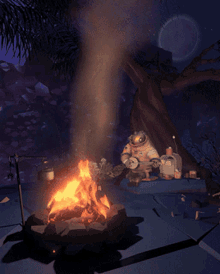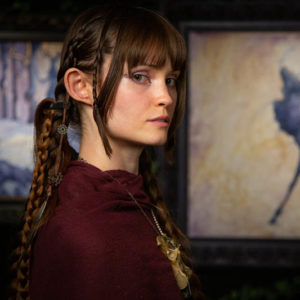Outer Wilds: The Transformative Power of Uncertainty and Faith
Part 1: Wilds and Hearth

The game begins with the character’s eyes opening along with a calm breath. It’s a first-person point-of-view game, so you see the black eyelids parting over the screen revealing a view of a green planet drifting slowly above. There’s a blue flash, something explodes near its surface, and a streak of blue light races across the star-speckled sky. It’s a lot to take in.
Then I look down at my immediate surroundings. Tall pines, cliff faces, shrubs, and a rickety wooden structure that looks like a mine. A more familiar setting than space, but still rugged.
But if you look down to your immediate surroundings you’ll find a cozier scene. There’s a campfire crackling softly by your feet, a sleeping bag, some gear and supplies strewn casually about, and someone on a log, a friend. Familiar. All things that evoke a sense of comfort and belonging.
I don’t believe this juxtaposition is accidental. Within the first seconds of the game, you’re exposed to three different layers of familiarity.
- Space: The Final Frontier
- Mysterious
- Very dangerous
- Extremely hard to get to
- The Wilderness: The Frontier
- Majestic, remote
- Somewhat dangerous
- A good hike will get you there
- The Hearth: Home
- Comfortable
- Safe and familiar
- Somewhere to live or always come back to
The closeness and warmth of a bonfire with friends, the rugged remoteness of the natural wilds, and farthest away: the dark expanse of space.
These symbols on their own don’t do much, but it’s how they’re transformed through the game’s journey that creates the emotional heart of the game.
When you see the sleeping bag, the bonfire, when you realize you can roast marshmallows on a stick, the immediate assumption is that your character is camping in the wilds somewhere.
The fire, the company, the supplies, all of these things exist to make a camper feel comfortable in the remote wilderness: far from home. A campsite can feel like home. It’s meant to be something to imitate those comforts when you’re far from them. Something transitional, temporary. A fire is put out, the tent is pitched, and the campers move on.
But as you walk away from the campsite, this assumption falls apart. This IS home. There are permanent structures nearby, albeit humble ones. A wooden rocket launching pad, walkways, and a cozy village nestled among the cliffs, pines, and hot springs.
The village hasn’t replaced nature but feels very much a part of the natural landscape.
You live on a planet called Timber Hearth, you are a Hearthian. The word hearth is important.
Hearth: a home, especially when seen as a place of comfort and love:
The Cambridge Dictionary
Speaking to other Hearthians allows you to learn that this is tightly knit community bound together by their love of exploration, music, and ingenuity. Hearthians evoke the spirit of a rugged pioneer, mapping out the wilds for the sheer love of discovery.
Except in this case, the frontier is no longer the wilds of Timber Hearth, but the wilds of space. The Hearthians have effectively taken what once was the wilds of their woods, their mountains, rivers, canyons, and made that part of their hearth.
Instead of taming the wilderness by replacing the forests with roads, cities, parking lots, and the sort of developments we have come to associate with civilization, the Hearthians do something else entirely. They don’t change the wilds to suit their idea of home, of hearth. Instead, their expand their hearth to encompass the wilds.
To us, camping in the woods is considered an adventure away from home. To the Hearthians, camping in the woods is part of being home, because they’ve expanded their hearth to encompass what would have once been the wilds. Their planet and everything in it is their hearth.
Sure, the Hearthians have houses and other structures they’ve built, but these structures seem to exist in harmony with the natural beauty of their planet. The wooden walkways, the log cabins, and even the observatory are reminiscent of the kind of structures we’d see at state or national parks: places where the human footprint is minimized as much as possible to preserve the natural state of the wilderness.
The next logical step for the Hearthians is to expand their hearth.
It’s not an accident that the Outer Wilds Ventures adopts the language and aesthetics of a rugged fellowship of explorers, braving dangers to pioneer expeditions into the solar system and beyond. The logo is even made to look like a wilderness explorer patch.

This isn’t some mega tech company leading the way to colonize other worlds. It’s not a military or government initiative.
And this is a crucial element that makes the game’s alchemy work.
From the very start of the game, whether the player realizes or not, there’s already alchemy at work. By simply exploring the world of Timber Hearth, you experience a collapsing of familiarity . What we on Earth would consider the wilds, something outside of our sense of familiarity and comfort, quickly becomes absorbed into the realm of the hearth.
There is still a sense of mystery and wonder, but these have become part of the character’s heart and home.
Hearthians bring a little piece of their hearth with them wherever they go. Even in the coldest reaches of the solar system, you’ll always find a Hearthian explorer lounging next to a crackling campfire, marshmallows at the ready, playing a familiar song.

Human campers might be familiar with an important camping principal: leave no trace. The idea of following this practice is to make sure the wilderness where you make camp remains unchanged by your presence. It seems the Hearthians extend this practice to remote worlds and Nomai ruins. There is as much of a drive to respect the wilds as there is to explore them.
Mike Collins of Apollo 11 fame once said this about the first time he could look back and see the Earth from space:
Oddly enough, the overriding sensation I got looking at the Earth was: My God, that little thing is so fragile out there.
Aleksei Leonov, Russian cosmonaut and the first person to ever conduct a spacewalk echoed similar sentiments to Mike Collins:
The Earth was small, light blue, and so touchingly alone. Our home that must be defended like a holy relic.

In spite of representing rival space programs and nations in embroiled in a Cold War, there was a comradery when they looked back at our home. In that moment, their sense of “hearth” expanded. It’s easy to think of the sanctuary of your home or bedroom as your hearth, a place of belonging and safety. But when seen as a tiny blue point in an expanse of black, I can imagine it becomes easier to feel the same kind of love and longing for entire planet that one feels when we’re far from the comforts of home.
Because you play a Hearthian, you ultimately view the game’s journey through the lens of this philosophy. Without this grounding, the themes encountered later would certainly fall flat.
The game is already making a several bold points.
It tells us that it is possible to expand our hearts and home without killing the wonder and beauty of the wilds. We can make the wilds part of our domain without taming them: an alternative to our usual discomfort with uncertainty. The Hearthians don’t eliminate uncertainty, they simply want to make it feel like home. They bring the comforts of home with them without permanently altering their destination.
Outer Wilds suggests that it is imperative to continue to venture beyond the hearth, even as you continuously expand its borders. As the Hearthians grow their sense of home, the frontiers of exploration must also grow.
Most importantly, I think the game echos a similar sentiment to Aleksei Leonov’s. Not only must the hearth be carefully expanded outwards into the unknown, but it must also be carefully tended, conserved, and loved. This conservation of community, this attachment to security is important, even necessary, in order to brave the dangers and cold of the uncertainties that wait beyond the hearth’s warmth and illumination.
If uncertainty and faith are the two primary elements that combine to lend Outer Wilds its spiritual potential, then the hearth is the crucible that holds them. It’s the heart that bridges the gap between those two ideas.
Faith means living with uncertainty – feeling your way through life, letting your heart guide you like a lantern in the dark.
Dan Millman

